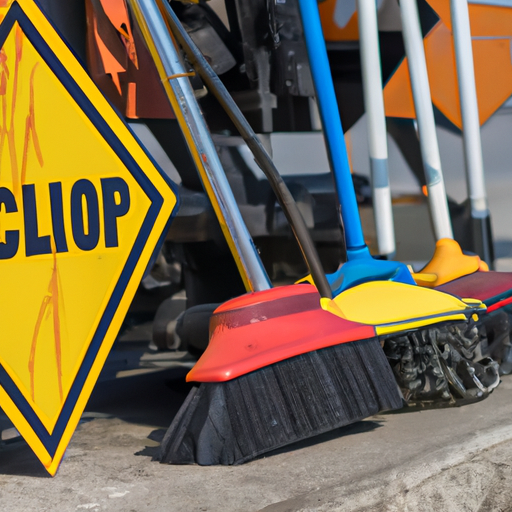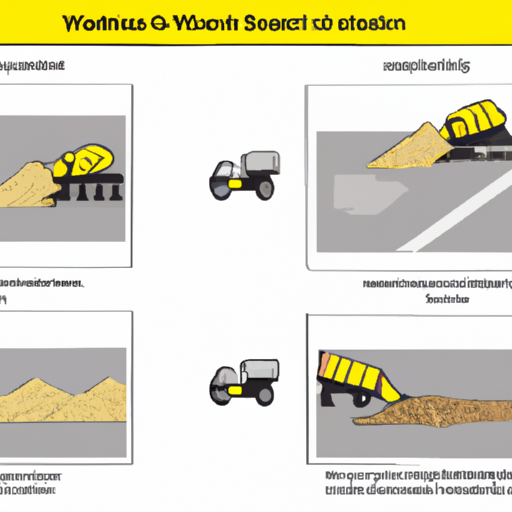Maintaining clean roads is crucial for the aesthetics, safety, and health of our cities. However, it's a task that comes with its own set of challenges and common pitfalls. This guide provides expert advice on how to avoid the most common road cleaning mistakes, aiming for impeccable results every time. Whether you're a professional or a community volunteer, our tips will help you get the job done efficiently and effectively.
1. 'The Right Tools for the Job – Are you using them?'
Using the right tools is crucial when it comes to road cleaning. Many people make the mistake of using whatever tools they have on hand, without considering whether they are suitable for the job. This can lead to subpar results and even damage to the road surface.
One common mistake is using a regular broom or brush instead of a specialized road sweeper. While a broom may be effective for sweeping leaves or debris off a sidewalk, it is not designed to handle the larger scale of road cleaning. A road sweeper, on the other hand, is specifically designed to efficiently clean large areas, with features such as powerful brushes and suction systems.
Another tool that is often overlooked is a pressure washer. A pressure washer can be extremely effective in removing stubborn stains and grime from the road surface. However, many people fail to utilize this tool and instead rely on manual scrubbing or ineffective cleaning solutions. By investing in a pressure washer and using it correctly, you can achieve much better results in a fraction of the time.
Finally, the use of proper safety equipment should not be overlooked. Road cleaning can be a hazardous task, especially if you are working near traffic. Wearing high-visibility clothing, gloves, and safety goggles is essential to protect yourself from potential accidents and injuries. Additionally, using traffic cones or barriers to create a safe work zone is highly recommended.
1. A photo showing a set of road cleaning tools with labels indicating their usage.
2. 'The Peril of Ignoring Weather Conditions – Do you consider them?'
When it comes to road cleaning, one of the biggest mistakes you can make is ignoring weather conditions. Weather plays a crucial role in the effectiveness of your cleaning efforts and the safety of those involved. Yet, many people fail to consider this important factor.
First and foremost, rain can greatly impact the results of road cleaning. Cleaning a road while it is raining can be counterproductive, as the water can wash away the cleaning solutions and make it difficult for them to work effectively. Additionally, wet road surfaces can be slippery and hazardous, increasing the risk of accidents for both cleaners and motorists.
Similarly, extreme weather conditions such as high winds or storms can also hinder road cleaning efforts. Strong winds can blow debris back onto the road, undoing your hard work. Storms can create additional hazards, such as fallen branches or flooding, which can make road cleaning impossible or dangerous.
Temperature is another crucial factor to consider. In colder climates, freezing temperatures can cause water or cleaning solutions to turn into ice, making the road surface even more treacherous. On the other hand, extremely hot temperatures can cause cleaning solutions to evaporate quickly, reducing their effectiveness.
Furthermore, it is important to note that different weather conditions may require different cleaning techniques or products. For example, during periods of heavy snowfall, it may be necessary to use snow plows or de-icing agents to clear the roads effectively.
3. 'The Importance of Proper Waste Disposal – Are you doing it right?'
Proper waste disposal is a crucial aspect of road cleaning that is often overlooked. Many people focus solely on cleaning the road surface without considering how to dispose of the waste generated. However, improper waste disposal can lead to environmental pollution, health hazards, and legal consequences.
First, when cleaning roads, various types of waste are generated, such as leaves, dirt, debris, and hazardous materials. It is important to separate these different types of waste and dispose of them appropriately. Failure to do so can result in contamination of water sources or soil, harming the ecosystem and potentially endangering human health.
Secondly, proper waste disposal involves using designated waste disposal sites or recycling facilities. Dumping road waste in unauthorized areas such as rivers, forests, or public spaces is not only illegal but also extremely harmful to the environment. It can lead to the degradation of natural habitats, pollution of water bodies, and the release of harmful chemicals into the air.
Furthermore, hazardous materials often need to be handled with extra care during road cleaning. These may include chemicals, oil spills, or sharp objects. Improper disposal of such materials can pose serious risks to the health and safety of both the cleaning crew and the general public. It is essential to follow guidelines and regulations set by local authorities to ensure the safe disposal of hazardous waste.
3. An illustration demonstrating proper road waste disposal techniques.
4. 'Understanding The Impact of Chemicals – Are you aware?'
When it comes to road cleaning, understanding the impact of chemicals is crucial. Many cleaning products and chemicals used in road cleaning can have detrimental effects on the environment and human health if not used correctly. It is essential to be aware of the potential risks and take necessary precautions to minimize harm.
Firstly, certain cleaning chemicals can be toxic to aquatic life and disrupt the balance of ecosystems. When these chemicals are washed away into nearby water sources, they can contaminate rivers, lakes, and oceans, harming aquatic plants and animals. It is important to choose cleaning products that are biodegradable and environmentally friendly to reduce the negative impact on water bodies.
Secondly, the improper use of chemicals can pose health risks to the cleaning crew and the general public. Some cleaning agents contain harsh ingredients that can cause skin irritation, respiratory problems, or allergic reactions. It is crucial to use protective gear, such as gloves and masks, when handling chemicals, and to follow the manufacturer's instructions for safe use.
Furthermore, the excessive use of chemicals can lead to pollution and air quality issues. Certain cleaning agents release volatile organic compounds (VOCs) into the air, contributing to air pollution and potential respiratory problems. Using chemicals in moderation and exploring alternative cleaning methods that minimize chemical usage can help reduce these negative effects.
Moreover, some chemicals used in road cleaning can have long-term impacts on soil quality and vegetation. It is important to consider the potential repercussions on plant life and soil fertility when using chemical-based cleaning products. Exploring eco-friendly alternatives or adopting sustainable practices can help minimize these impacts and promote a healthier environment.
Road Cleaning Mistakes to Avoid:
| Mistake | Consequence | Solution | Comments |
|---|---|---|---|
| Ignoring Traffic Signs | Delays or Injury | Follow Traffic Signs | Be Aware of Your Surroundings |
| Not Wearing Protective Gear | Risk of Injury | Wear Appropriate Gear | Be prepared for any situation |
| Using Incorrect Cleaning Equipment | Damage to Road | Choose the Right Tools | Know Your Equipment |
| Neglecting Regular Maintenance | Loss of Efficiency | Schedule Timely Maintenance | Be proactive |
Road cleaning is a complex task that requires careful planning, the right tools, and proper techniques. By avoiding the common mistakes outlined in this guide, you can ensure that your efforts lead to clean, safe, and well-maintained roads. Remember, it's not just about making the roads look good – it's about ensuring a healthy environment and safe journey for everyone.



